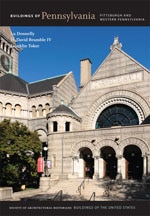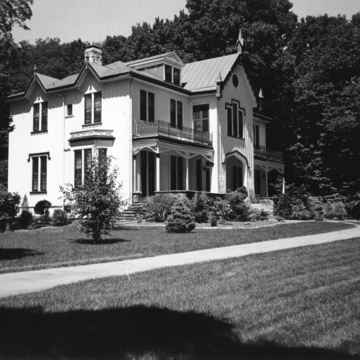This is one of America's first “romantic” suburbs, a few years before Alexander Jackson Davis's better-known Llewelyn Park in West Orange, New Jersey. Six families contracted to build on this hilltop five miles north of downtown Pittsburgh, in what must have been a reflection of the glorification of rural life in these years by poet Henry David Thoreau. In the end, only four houses rose on the eighty-five-acre site, for William Hill, William Shinn, Robert Sellers, and Wade Hampton. The Hampton (102 Rock Ridge Road) and Sellers (161 Rock Ridge Road) houses are boxy in shape, with their walls covered in shiplap siding. Hill's house (164 Rock Ridge Road) is more recognizably Gothic Revival in its gabled front and vaguely Tyrolean porch design—an amalgam of rural cottage designs found in Andrew Jackson Downing's three books on architecture and landscaping published between 1841 and 1852. Inside, the T-shaped disposition of the main rooms is more dynamic without being in any literal way Gothic. Only the cottage of the colony's founder, William Shinn (168 Rock Ridge Road), fully complies with the ethos, style, and environmental concerns of Downing. It is cruciform shaped, the walls covered with board-and-batten siding, and the bargeboards beautifully cut in intricate curves. Coming up to it on the deliberately winding road from below, one would be well prepared to meet the reclusive Thoreau himself.
You are here
Evergreen Hamlet
1851–1852, Joseph W. Kerr, Heastings and Preiser, landscape architects. Rock Ridge Rd. just north of intersection of Babcock Blvd. and Evergreen and People's Plank Rd., Ross Township
If SAH Archipedia has been useful to you, please consider supporting it.
SAH Archipedia tells the story of the United States through its buildings, landscapes, and cities. This freely available resource empowers the public with authoritative knowledge that deepens their understanding and appreciation of the built environment. But the Society of Architectural Historians, which created SAH Archipedia with University of Virginia Press, needs your support to maintain the high-caliber research, writing, photography, cartography, editing, design, and programming that make SAH Archipedia a trusted online resource available to all who value the history of place, heritage tourism, and learning.















